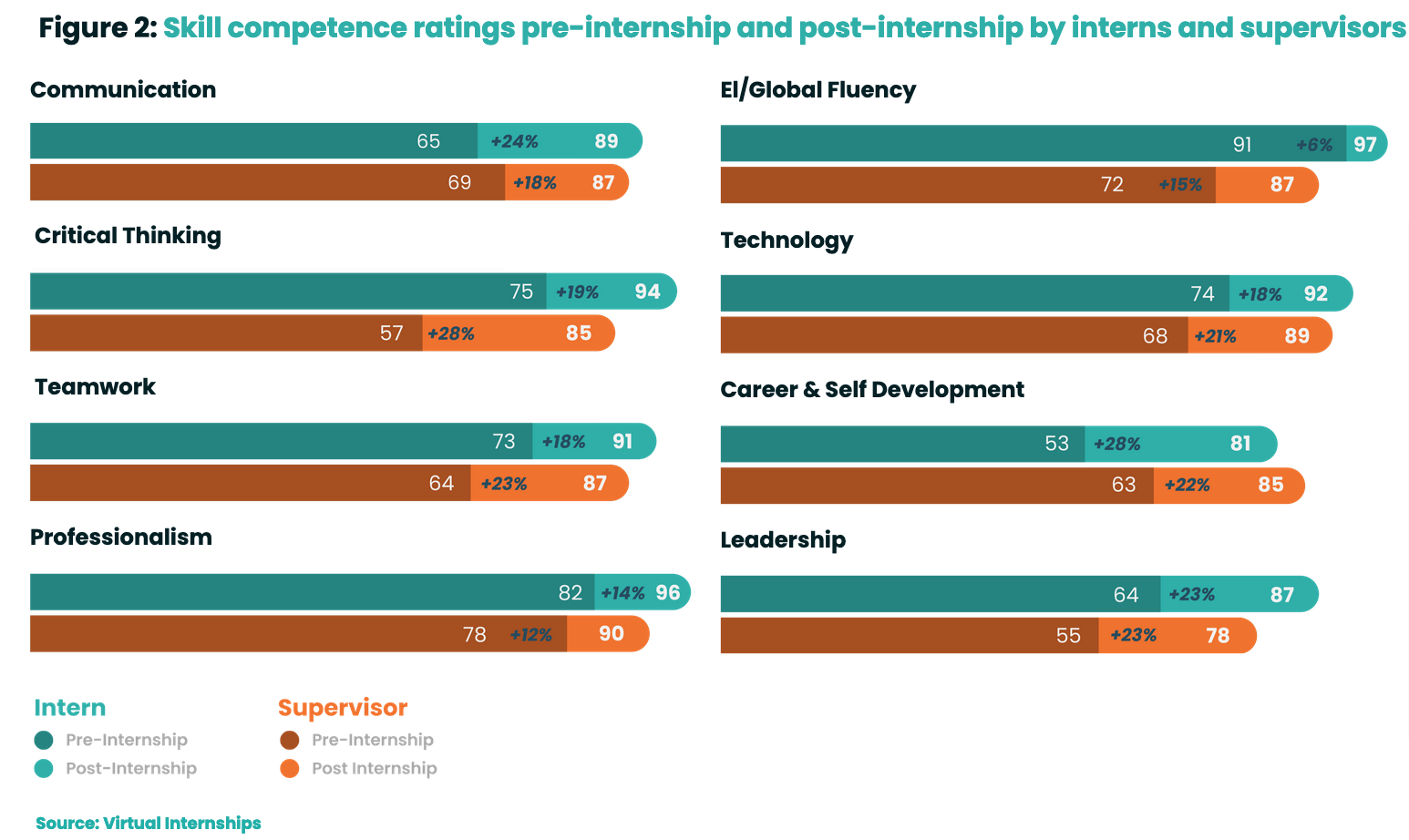
UNIVERSIDAD 2024
VIRTUAL INTERNSHIPS
By Ed Holroyd Pearce, President & Co-Founder
Bridging the global skills gap
Heraclitus’ words – change is the only constant – have never been more true than today. No doubt those going through the arrival of electricity, the industrial revolution, or many other periods of history would have felt the same. Yet the speed of change, technological change in particular, seems to be at an all-time high and continues to be (and feel) exponential. There is nothing to suggest the speed of this change will reduce, on the contrary – it is highly likely to continue in its current trajectory. That pace of change is felt by workers around the world who are increasingly navigating the realities of the modern work environment: one that is more remote, more flexible, with distributed teams in a global context. This is the environment under which Virtual Internships was founded and is growing – and we firmly believe that those who are best prepared to function well in these times of constant change will be the most successful. How do we go about ensuring it’s not just those with the best access to technology who seize the benefits?
Leaving No-one Behind
With the prevailing context of leaving no-one behind, the most powerful part of Virtual Internships’ provision is that the internships are guaranteed. You do not need to be the top of your class, nor the one with relatives in the best jobs. You do not need to be a student at an Ivy-League or Red-Brick university. With over 13,000 host companies around the world already signed up and equating to 250,000 internship opportunities – and more being added every second – there is quite literally an experience to suit everyone. Global work experience delivered remotely can assist anyone to access a real-life work experience; the usual barriers (and many more) are significantly reduced, if not removed completely.
Those who have traditionally been locked out from gaining work experience due to family or childcare commitments, physical disabilities or neurodiversity – or more geographical factors such as lack of relevant local industry placements, or difficulties with transportation – can now gain real exposure to a business or organization where they can nurture their potential. Likewise, businesses have many of their barriers removed – no need for a desk space, an on-site mentor or a social program for ‘the summer interns’ – Small and Medium sized enterprises (SMEs) can participate just as easily as their bigger and better resourced industry leaders. The program harnesses all possible flexibility – it lasts between one and four months, part time or full time, with start dates anytime throughout the year – removing this bottleneck of ‘summer’ internships which rarely work well for non-traditional learners.
Bridging the skills gap
Much of our program is centered around supporting interns to develop transferable career-readiness skills – specifically using the NACE framework of eight core competencies. Multiple surveys highlight lack of work-readiness of college graduates. A recent survey of 1243 US businesses said four in ten business leaders feel recent college graduates are not ready for the workforce1. While a different survey of recent US graduates suggests a similar problem – almost 40% feel their college or university did an inadequate job preparing them for the workplace2. In the UK the figure of graduates feeling unprepared for the workforce rises to nearer 50%3, and a further study found nearly 80% of employers believe graduates aren’t work-ready4. On top of this, the World Economic Forum has labeled Critical Thinking and Problem Solving as the top skills which employers believe will grow in prominence in the next five years5.
Within this context, the first goal of the program is to make candidates aware of these key transferable skills which are in greatest demand by employers. The next goal is to work on how those candidates improve each of those skills and then improve their ability to narrate this recent exposure and skills gain. By matching them with real world host companies, supervisors and projects the participant becomes able to articulate and evidence these skills – whether this is on their CV or in an interview situation. The pedagogical focus really is on transitioning from theory to practice, or more commonly referred to as ‘learning-by-doing’, but ensuring a high level of self-awareness and improving the ability to articulate experiences. We deliver the ‘learning’ through an online curriculum, paired with live touchpoints including coaching calls at the mid-point and end-point of the internship with learners and their coach co-creating a Global Career Management Plan after the program. 75% of participants in North America gain academic credit for taking the Virtual Internship program. Individual candidates receive Virtual Internships certification and can also access our school of record to provide credit for transfer.
Traction – ROI & Impact
To date, we have placed over 9,500 participants from over 65 countries in the world. Our earliest traction was in core markets from the global north – from universities struggling with the employability of their graduates; or coming up against complex return-on-investment (ROI) questions from international and domestic students or their parents. It is encouraging to see a growing uptake among participants from the global south and less developed economies and it is particularly heartening to see partnerships serving learners from marginalized backgrounds beginning to increase. In these scenarios the ability to access international work experience without the associated costs and barriers can be even more impactful on lives and livelihoods.
Case Study: Virtual Internships & University of Sussex6
The University of Sussex Online Global Summer Internship Programme, funded by the university and delivered in partnership with the Virtual Internships, provides real-world, global work experience to students from underrepresented groups through remote internships. It includes a short-term project-based work experience of four weeks (120 hours) as well as wraparound employability support delivered by Virtual Internships. This support
includes an online platform enabling students to build a portfolio of weekly reflections, a self-paced online career readiness curriculum, one-to-one coaching sessions at key points during the programme, and fortnightly employability webinars.
In the past four years, the programme has placed 331 students in companies based across 54 different countries, including Kenya, Barbados, South Korea and Uruguay.
Predominantly supporting students from underrepresented groups, and providing a stipend commensurate with the Living Wage, the programme aligns with the university’s commitment to ensuring that all students have access to career-building opportunities.
76% of students participating in the internship felt more confident about obtaining a full time job in the future, and 87% agreed they gained value from their internship experience. For this cohort, the highest skill growth was seen in Communication Skills (24% increase during the program) with 94% of host company supervisors ranking their Sussex interns as ‘Competent’ or above. (see below for further information on skills gain and pre- and post- program evaluation) The impactful outcomes and multi-year growth of this program are testament to forward thinking and immensely collaborative partners at the University of Sussex.
Scalability & Mass Implementation
To really summarize what we’re doing, one needs to see that each individual internship is going to be a unique experience – in each pairing of a learner with a host company supervisor, there will be different inputs, different tasks, different discoveries. This has often been the downfall of embedding large-scale work experience programs into degrees. However, by ensuring that the touchpoints and supports are standardized across all learners, and ensuring that these are relevant and well-used, we transform what is a unique experience into a scalable, trackable, reportable experience with standardized outcomes – making it suitable for mass implementation.
Through our reporting, a partner can observe and track the skills gain of a particular cohort – learners self-evaluate their skills at the start of the program and again at the end, and we have added an opportunity for triangulation or verification of skill level by asking the host company supervisors to rate the skills of the candidates. The candidates answer 27 questions (three per core competency7), looking at how they display the skill in the workplace. The supervisors answer 9 questions (one for each skill) to find out to what extend the supervisor feels the intern demonstrated each competency. This gives us knowledge of average gain in each skill across the cohort, individual gain in each skill for each learner, and also highlights any over- or under-confidence when we compare the learner’s self-evaluation against the supervisor’s skill evaluation of the learner.
Interestingly it’s more common for learners to under-state their competency level when compared with the supervisor’s opinion. Our live coaching calls draw out these findings, improve the articulation ability of the learners and in the case where supervisors are more positive about a competency than the participant, this can give a great confidence boost. A recent report “Unlocking Career Readiness8” shows average skills gain across the eight core competencies – verified by the host company supervisor – is 18%.

Addressing the speed of change across many industries
It is worth considering how such a program works particularly well against the background of super-fast technical innovation we are seeing across a range of different industries. As Chat GPT exemplifies, scenarios where learners and faculty are both learning about new technologies at the same time will become more commonplace – usage of new technology and tools by industry and learners will continue to outpace curriculums. Even education disruptors such as third-party providers or bootcamps designing their own content are likely to have some latency when compared to real adoption of technologies by companies – the timeline for creating study materials, enrolling learners and delivering programs lasts months or even years, while everyone wants ‘work ready graduates’.
Let’s not forget, Chat GPT had 100 million users just 2 months after being launched – it’s understandable that a university curriculum or even bootcamp content wouldn’t be developed fast enough to capture such topics fully. This is why we wholeheartedly evangelize the solution of getting the learners into real businesses – they get to see the real picture of which technologies are being adopted in their chosen industry and how they are used and will therefore be empowered to upskill themselves in appropriate ways as they approach graduation and the hunt for employment. Although technology is front of mind for many in this current time, the same can also be said when considering the speed of change in many other industries. Can an institution’s legal curriculum reflect current industry best practice or client needs without giving learners direct exposure? Unlikely. Could a finance student learn more about the current tools and industry trends in an online placement with a live company, compared to learning from a curriculum developed five years earlier? Almost certainly!
We also track employment outcomes, which vary from cohort to cohort – a great deal depends on the stage the learner is at when taking our program. Some educational partners embed the program in year 1, as a form of career exploration tool, while others implement it in the final year before a student graduates – this explains why across two cohorts the employment outcomes would be totally different. On average, one in four participants gets employed or is offered an extension of their internship. The highest employment outcome thus far was 52% employment among a cohort of 50 refugees based in Lebanon. Several other cohorts – particularly those attached to bootcamps, or servicing career-switchers or mature learners – have employment outcomes nearing 50%.
We believe that as technological adoption and innovation continues apace across multiple industries, educational institutions will struggle with their ROI if they don’t improve connectivity to the workplace. The Edtech industry, and its individual players, must continue to tirelessly innovate and work to remove the barriers and friction for both the end user, and the educational partners such as universities. Outside the university segment, the need for employability programs such as Virtual Internships is equally stronger among governments and foundations looking to support marginalized populations and non-traditional learners – or even demographically bottom-heavy geographies with high structural youth unemployment – 2022 and 2023 saw an increase in uptake of such partnerships.
Future Iterations
Reflecting the need to serve our clients an ever improving program at the most competitive price point, our own internal adoption of technology will be pursued with urgency – can we provide AI powered behavioral nudges during the internship to further improve outcomes? Can we harness virtual reality or augmented reality environments to increase engagement between learner and host company supervisor? Could our human coaching calls be replaced or enhanced with AI coaching to increase convenience for the learner and further reduce program costs? How about delivering the program – including curriculum content, platform content and coaching calls – in multiple languages, removing the current “recommended English language level” for participants? We believe so! By achieving these and more program improvements, we can quite literally open a world of opportunities for those global populations seeking access to better work and better lives.
Author: Ed Holroyd Pearce
President & Co-Founder of Virtual Internships

Universidad 2024 was created in collaboration with:
The Proeduca Group:
PROEDUCA’s objective is to provide the best online higher education to its students and it achieves this through educational commitments at three universities: The International University of La Rioja, the Online University of Mexico (UNIR Mexico), and CUNIMAD. It also offers studies located in Peru, at the Newman Postgraduate School, and in the United States, where it has a presence through MIU City University Miami.

Works cited:
[1] https://www.intelligent.com/4-in-10-business-leaders-say-recent-college-grads- are-unprepared-to-enter-workforce/
[2] https://www.insidehighered.com/quicktakes/2023/01/12/survey-finds-re- cent-grads-emotionally-unprepared-work
[3] https://protect-eu.mimecast.com/s/nDRaCj8O2Inn5WQi7BJEd?domain=jisc. ac.uk
[4] https://www.managers.org.uk/wp-content/uploads/2021/09/employability- skills-research_work-ready-graduates.pdf
[5] https://www.weforum.org/agenda/2020/10/top-10-work-skills-of-tomorrow- how-long-it-takes-to-learn-them/
[6] As detailed in AGCAS Phoenix magazine, November 2023: https:// www.agcas.org.uk/write/MediaUploads/Phoenix/PhoenixIssue169Novem- ber2023.pdf
[7] We break Equity and Global Fluency into two questions, hence 9 questions for 8 core skills
[8] https://info.virtualinternships.com/unlocking-career-readiness-2023